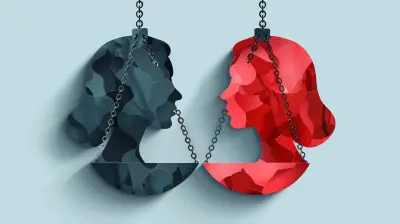How Trauma Affects Mental Health in Adolescents
22 May 2025
Adolescence is a time of immense growth, both physically and emotionally. It's that tricky period where you’re no longer a child, but not quite an adult either. For many teenagers, this phase is filled with challenges, from figuring out their identity to navigating social pressures. But what happens when beyond the typical struggles of adolescence, trauma enters the picture? How does trauma affect mental health in adolescents?
Trauma can leave a lasting impact, especially on young, developing minds. Unfortunately, it’s an experience many teens face due to various reasons—abuse, neglect, accidents, the loss of a loved one, or even bullying. Understanding the ripple effects of trauma during adolescence is essential, as it can shape their mental health, behavior, and future.
In this article, we’ll dive deep into how trauma affects mental health in adolescents, discuss the signs to look out for, and explore ways to support teens who’ve been through traumatic experiences.

What Is Trauma?
Before we get into the nitty-gritty of how trauma affects mental health, let’s first define trauma.Trauma refers to an emotional response to a deeply distressing or disturbing event. Trauma can come in many forms—physical, emotional, or mental—and people react to it differently. For an adolescent, something like parental divorce, witnessing violence, experiencing abuse, or even moving to a new city can be traumatic.
The key thing to remember here is that trauma is subjective. What might seem like a minor event to one person could have lasting emotional scars on another. Teens, in particular, are more vulnerable because they are still in the process of developing their coping mechanisms.

How Trauma Affects the Developing Brain
Adolescence is a critical time for brain development. The brain is like a sponge during these years, soaking up experiences and learning how to respond to the world. But trauma can throw a wrench into this process.When a teen experiences trauma, their brain goes into survival mode. This is often referred to as the "fight, flight, or freeze" response. Their brain perceives the traumatic event as a threat, so it releases stress hormones like cortisol and adrenaline to prepare for danger. While this response is helpful in the short term, repeated or prolonged trauma can lead to long-term changes in brain structure and function.
The Amygdala, Hippocampus, and Prefrontal Cortex
Three key parts of the brain are heavily impacted by trauma: the amygdala, hippocampus, and prefrontal cortex.- Amygdala: This is the brain’s alarm system. It helps detect threats and triggers the fight, flight, or freeze response. In teens who've experienced trauma, the amygdala can become overactive, making them hypervigilant or overly anxious.
- Hippocampus: This part of the brain is responsible for memory and learning. Trauma can shrink the hippocampus, making it harder for teens to process and store new information or recall previous events accurately.
- Prefrontal Cortex: The prefrontal cortex is in charge of decision-making and impulse control. Trauma can disrupt its development, leading to poor judgment, impulsivity, and difficulty regulating emotions.
These changes in the brain can cause adolescents to respond to situations with heightened fear or aggression, even when there’s no actual threat. It's no wonder that trauma can lead to mental health issues during these formative years.

Common Mental Health Issues Tied to Trauma in Adolescents
Trauma can manifest in different ways, depending on the individual and the severity of the experience. Common mental health issues that often arise in adolescents following trauma include:1. Post-Traumatic Stress Disorder (PTSD)
One of the most direct consequences of trauma is Post-Traumatic Stress Disorder (PTSD). PTSD occurs when a teen has difficulty recovering from the trauma, often reliving the event through flashbacks, nightmares, or intrusive thoughts. They may also avoid anything that reminds them of the trauma and experience heightened anxiety or fear.2. Anxiety Disorders
Trauma can leave adolescents feeling constantly on edge, as if danger is lurking around every corner. This often results in generalized anxiety disorder or panic attacks. Everyday situations—like going to school or meeting new people—can trigger overwhelming bouts of stress and worry.3. Depression
Trauma can also lead to feelings of sadness, hopelessness, and a loss of interest in activities once enjoyed, all of which are hallmark signs of depression. Adolescents may feel isolated, misunderstood, and powerless to change their situation.4. Substance Abuse
In an attempt to numb emotional pain, some teens may turn to drugs or alcohol. Substance abuse can act as a temporary escape from their feelings, but it ultimately exacerbates their mental health issues and can lead to addiction.5. Self-Harm and Suicidal Ideation
Sadly, some adolescents may resort to self-harm as a way of coping with emotional pain. Cutting, burning, or engaging in other forms of self-harm are cries for help. In severe cases, the feelings of despair can lead to suicidal ideation, where the teen begins to contemplate taking their own life.
Behavioral Changes to Look Out For
Recognizing trauma in adolescents can be challenging, especially since many teens may not openly discuss their feelings. However, there are certain behavioral changes that might signal a teen is struggling with the effects of trauma:- Withdrawing from friends and family: Teens may isolate themselves or seem distant from the people they once enjoyed being around.
- Sudden changes in mood: Look for extreme mood swings, irritability, or bouts of anger that seem disproportionate to the situation.
- Decline in academic performance: Traumatized teens may struggle to focus in school or lose interest in their studies.
- Risk-taking behaviors: Reckless driving, substance abuse, or promiscuity can be ways for teens to seek out control or escape from their trauma.
- Physical symptoms: Chronic headaches, stomachaches, or fatigue are common physical manifestations of trauma.
The Importance of Early Intervention
The longer trauma goes unaddressed, the more it can compound and affect an adolescent's mental health. Early intervention is crucial because it allows teens to process their trauma, develop healthy coping mechanisms, and prevent long-term damage to their mental well-being.Therapy and Counseling
One of the most effective ways to help adolescents deal with trauma is through therapy. Different forms of therapy, such as Cognitive Behavioral Therapy (CBT) or Trauma-Focused Cognitive Behavioral Therapy (TF-CBT), can help teens reframe their thoughts and emotions surrounding the traumatic event. Talking to a trained mental health professional provides a safe space for teens to express their feelings without judgment.Building Support Systems
It’s also important for teens to have a strong support system. Whether it’s family, friends, or school counselors, knowing they have people who care about their well-being can go a long way in helping them heal. Encourage open communication, and let them know it's okay to ask for help.Mind-Body Practices
In addition to therapy, practices like mindfulness, meditation, or yoga can help teens manage the stress and anxiety that come with trauma. These techniques teach them how to ground themselves in the present moment, reducing the intensity of intrusive thoughts or flashbacks.
How to Support a Teen Who Has Experienced Trauma
If you suspect that a teen in your life is dealing with trauma, here are some ways you can offer support:- Listen without judgment: Sometimes, all a teen needs is to be heard. Let them talk about their experiences without fear of being criticized or dismissed.
- Be patient: Healing takes time. Don’t expect them to “get over it” quickly. They may need more time than you realize to process their emotions.
- Encourage professional help: It’s okay to suggest therapy or counseling. Let them know that seeking help is a sign of strength, not weakness.
- Reassure them: Remind them that what they’re feeling is valid. Trauma can make people feel broken or abnormal, but it’s important they know they’re not alone.
- Create a sense of safety: Whether it’s at home or school, ensure the teen has a stable environment where they feel secure and supported.
Conclusion
Trauma can have a profound impact on the mental health of adolescents, but with the right support and interventions, they can learn to heal and move forward. Recognizing the signs of trauma and understanding its effects on the brain and behavior are the first steps in helping teens navigate their recovery journey. Remember, trauma doesn’t have to define their future. With time, care, and professional help, adolescents can rebuild their sense of self and regain control over their mental health.all images in this post were generated using AI tools
Category:
Mental Health In AdolescenceAuthor:

Nina Reilly
Discussion
rate this article
2 comments
Zaylee Kirkland
Trauma can profoundly shape an adolescent's mental landscape, influencing behaviors, relationships, and self-perception. Understanding these effects is crucial for fostering resilience and providing necessary support for healing and growth.
June 10, 2025 at 3:19 AM

Nina Reilly
Thank you for your insightful comment! I completely agree—recognizing the impact of trauma on adolescents is vital for nurturing resilience and supporting their healing journey.
Elin Thornton
Healing takes time; hope is powerful!
May 24, 2025 at 4:18 PM

Nina Reilly
Absolutely, healing is a journey, and cultivating hope can significantly support recovery during challenging times. Thank you for your insight!


